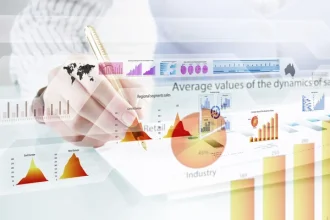Blockchain accounting is changing the way we think about financial records. As we move into 2025, it’s clear that this technology is not just a trend; it’s a fundamental shift in how businesses manage their finances. By offering a secure and transparent way to record transactions, blockchain is set to enhance trust and efficiency in financial reporting. This article will explore the various aspects of blockchain accounting, its benefits, challenges, and what the future holds for this exciting technology in the accounting world.
Key Takeaways
- Blockchain accounting improves transparency by decentralizing data, making it harder for fraud to happen.
- With blockchain, companies can achieve real-time financial reporting, speeding up the auditing process.
- Smart contracts automate various accounting tasks, which can save time and reduce costs.
- The technology helps minimize human errors, leading to more accurate financial statements.
- Adopting blockchain will require new skills and a shift in how organizations operate.
Understanding Blockchain Accounting
Blockchain is making its way into accounting, and it’s not just about cryptocurrency anymore. It’s changing how financial data is handled. Let’s break down what blockchain is and why it matters for accounting.
What Is Blockchain Technology?
So, what exactly is blockchain? Think of it as a digital ledger that’s spread across many computers. This makes it secure and transparent. Instead of one central database, everyone on the network has a copy. When a transaction happens, it’s added to a “block,” which is then linked to the previous block, forming a “chain.” This chain is nearly impossible to tamper with.
- Decentralization: No single point of control.
- Immutability: Once a block is added, it can’t be changed.
- Transparency: All participants can view the ledger. This blockchain technology is expected to grow in accounting.
How Does Blockchain Improve Transparency?
Blockchain’s design inherently boosts transparency. Every transaction is recorded on a public ledger, accessible to all participants. This eliminates the information asymmetry that often plagues traditional accounting systems. No more hidden entries or backdated adjustments. The cryptographic links between blocks ensure that any attempt to alter a record is immediately detectable. This level of transparency builds trust among stakeholders, including investors, regulators, and auditors, fostering confidence in financial reporting and decision-making processes.
Read More:
Key Features of Blockchain Accounting
Blockchain accounting brings several key features to the table, changing how financial data is managed and reported. These features address some of the long-standing issues in traditional accounting practices.
- Immutability: Once a transaction is recorded, it cannot be altered or deleted. This ensures the integrity of financial records.
- Transparency: All participants can view the ledger, promoting accountability and trust.
- Real-time Tracking: Transactions are recorded in real-time, providing up-to-date financial information.
- Smart Contracts: Automate various processes, saving both time and money. Smart contracts automate compliance checks, budget approvals and other internal controls, helping to streamline processes, reduce operational costs, and improve efficiency.
Blockchain removes the middleman. This has several benefits:
Reduced costs: No need to pay intermediaries.
Increased speed: Transactions can be faster.
Greater accessibility: More people can participate in the financial system.
Benefits of Blockchain in Financial Reporting

Immutable Financial Records
Blockchain’s decentralized ledger makes sure that once a transaction is recorded, it’s permanent. Think of it like this: once it’s in, it’s in. No take-backs. This immutability is a game-changer for accounting, because it gets rid of the risk of anyone messing with the numbers after the fact. It gives stakeholders a single, reliable source of truth. This is a big deal for maintaining the integrity of financial records.
Enhanced Transparency and Trust
Every transaction on the blockchain is linked to the ones before it, creating a clear trail. This makes it easier to audit and builds trust among investors, regulators, and auditors. Everyone can see what’s going on, which boosts confidence in financial reporting. It’s like having an open book that everyone can check.
Streamlined Processes and Cost Reduction
Blockchain can automate a lot of the manual tasks that accountants do, which cuts down on complexity and costs. For example, smart contracts can automate routine transactions and make sure everyone follows the rules. This streamlines operations and reduces the need for middlemen.
By automating tasks and getting rid of intermediaries, blockchain can really cut down on the costs and time involved in accounting. This lets companies focus on more important things than just keeping the books straight.
Real-Time Financial Reporting with Blockchain

Continuous Ledger Updates
Okay, so picture this: instead of waiting for the end of the month, quarter, or year to see how a company is doing, blockchain lets you see what’s happening right now. This is because blockchain creates a continuously updated ledger. It’s like having a live feed of all the financial transactions. This is a big change from how things used to be, where you’d have to wait for reports to be compiled. Juniper Research estimated that B2B transactions will surpass $111 trillion by 2027, and real-time reporting will be a huge part of that.
Instant Access to Financial Data
With blockchain, authorized users can get to financial data instantly. No more waiting for someone to send you a report or give you access to a system. It’s all there, ready to go. This is super useful for making quick decisions and staying on top of things. Plus, it makes financial records way more accessible. FinProfm is working on features to enhance its crypto trading platform, and instant data access will be key for users.
Impact on Decision-Making
Real-time financial reporting can really change how companies make decisions. When you have up-to-the-minute data, you can react faster to changes in the market, spot problems early, and make better choices overall. It’s like having a superpower for business. Plus, it helps build trust with investors and stakeholders because they can see what’s going on in real-time. Think about it:
- Faster reaction to market changes.
- Early detection of financial issues.
- Improved investor confidence.
Real-time data means companies can be more agile and responsive. They can adjust their strategies based on the latest information, leading to better outcomes. It also promotes transparency, which is always a good thing.
Integration of Blockchain with Emerging Technologies
Blockchain isn’t living in its own little bubble. It’s playing nice with other cool technologies, and that’s where things get really interesting. Think about it: blockchain’s security plus the brainpower of AI? Or blockchain’s transparency combined with the data-collecting skills of IoT? It’s a recipe for some serious innovation in accounting.
Synergies with Artificial Intelligence
AI and blockchain are like peanut butter and jelly. AI can help make sense of all the data that blockchain provides, spotting trends and making predictions that would be impossible for humans to see. This means better forecasting, risk management, and fraud detection. Imagine AI algorithms constantly monitoring blockchain transactions, flagging anything suspicious in real-time. It’s a powerful combination.
Machine Learning Applications
Machine learning (ML) takes it a step further. ML algorithms can learn from historical blockchain data to improve accounting processes. For example, an ML model could learn to automatically categorize transactions, reducing the need for manual data entry. Or it could predict when invoices are likely to be paid late, allowing accountants to take proactive steps. It’s all about using data to make things smarter and more efficient. Machine learning applications can help with FinTech transformation.
The Role of IoT in Accounting
The Internet of Things (IoT) brings physical devices into the mix. Imagine sensors on a construction site automatically recording material usage and sending that data directly to a blockchain-based accounting system. Or think about smart meters tracking energy consumption and automatically generating invoices. IoT can provide a constant stream of real-time data, making accounting more accurate and efficient. It’s about connecting the physical and digital worlds to create a more transparent and automated financial system.
The convergence of blockchain with AI, ML, and IoT is not just a futuristic fantasy. It’s happening now, and it’s going to revolutionize the way we do accounting. By embracing these technologies, businesses can create more transparent, efficient, and secure financial systems.
Future Trends in Blockchain Accounting
Predictions for Blockchain Adoption
Blockchain’s role in accounting is still developing, but it’s expected to grow significantly. More businesses will likely adopt blockchain-based solutions as they become more aware of its advantages.
- Increased use of blockchain for supply chain finance.
- More advanced smart contracts automating complex financial agreements.
- Greater acceptance of digital assets in corporate holdings.
Blockchain tech is moving fast, and it’s not just about crypto anymore. We’re seeing more sophisticated uses pop up all the time. These trends will change how accounting works, making it more efficient and secure.
The Evolution of Financial Governance
Blockchain can change financial governance by making it more transparent and accountable. Triple-entry accounting, where a third, public ledger is updated with each transaction, could become standard. This would give regulators and stakeholders real-time access to verified financial data. Decentralized autonomous organizations (DAOs) might also change how companies are structured and governed.
Impact on Corporate Structures
Blockchain could lead to new corporate structures. DAOs, for example, could become more common, changing how companies are managed and how decisions are made. This could also affect how companies interact with stakeholders and how they are regulated. The rise of BTCU Ultimatum and similar technologies will likely play a role in this evolution.
Challenges in Implementing Blockchain Accounting
Blockchain accounting is gaining traction, but it’s not without its hurdles. Let’s look at some of the main challenges companies face when trying to bring blockchain into their financial operations.
Skill Gaps in the Workforce
One of the biggest problems is the lack of people who really understand blockchain. Most accountants and auditors don’t have the skills needed to work with this new technology. They need training in areas like cryptography, distributed ledger technology, and smart contracts. Without this, companies will struggle to implement and manage blockchain-based accounting systems. It’s not just about understanding the tech; it’s also about knowing how it changes existing accounting practices. We need to bridge the skill gaps to fully realize the potential of blockchain in accounting.
Regulatory Compliance Issues
Regulations around blockchain are still developing, and this creates a lot of uncertainty. Different countries have different rules, and sometimes there are no clear rules at all. This makes it hard for companies to know if they’re following the law when using blockchain for accounting. They need to consider things like data privacy, security, and how blockchain transactions are treated for tax purposes. Until there’s more regulatory clarity, many companies will be hesitant to fully adopt blockchain.
Resistance to Change in Organizations
Getting people to accept new technology can be tough. Many organizations are used to traditional accounting methods and may resist changing to blockchain. This resistance can come from different levels, from top management to individual employees. People may be worried about job security, or they may simply not want to learn something new. Overcoming this resistance requires clear communication, education, and showing people the benefits of blockchain accounting. It’s about making them see how it can make their jobs easier and more efficient. Change management is key to successful blockchain implementation.
It’s important to remember that implementing blockchain accounting is a journey, not a destination. There will be challenges along the way, but by addressing these challenges head-on, companies can unlock the full potential of this transformative technology.
The Role of Smart Contracts in Accounting
Automating Financial Transactions
Smart contracts are changing how accounting works. They’re basically self-executing agreements written into code and stored on a blockchain. This means that when certain conditions are met, the contract automatically carries out the terms, without needing someone to manually oversee it. Think of it like a vending machine for financial deals – you put in the right inputs, and the output is guaranteed.
- Payments can be automated when goods are received.
- Royalties can be automatically distributed based on sales data.
- Escrow services can be handled without a middleman.
Smart contracts can really cut down on the time and effort needed for routine financial tasks. They also reduce the risk of human error, which is always a plus.
Ensuring Compliance and Accuracy
One of the coolest things about smart contracts is how they can help with compliance. Because the rules are coded directly into the contract, it’s much easier to make sure everything is done by the book. For example, tax compliance can be automated, ensuring that taxes are calculated and paid correctly. Plus, because everything is recorded on the blockchain, it’s easy to audit and verify that the contract was executed as agreed. This can be a game-changer for industries that are heavily regulated.
Reducing Administrative Overhead
Let’s face it: paperwork is a pain. Smart contracts can seriously cut down on the amount of administrative work needed in accounting. By automating tasks like invoicing, payments, and reconciliations, companies can free up their staff to focus on more important things. This not only saves time and money but also reduces the risk of errors that can happen when things are done manually. It’s all about making things more efficient and less of a headache. Imagine a world where financial transactions happen automatically, without all the back-and-forth emails and phone calls. That’s the promise of smart contracts.
| Task | Traditional Method | Smart Contract Method | Benefits |
|---|---|---|---|
| Invoice Processing | Manual entry | Automated | Faster, fewer errors |
| Payment Reconciliation | Manual matching | Automatic matching | Reduced workload, improved accuracy |
| Auditing | Sampling | Full data access | More thorough, real-time insights |
Looking Ahead: The Impact of Blockchain on Accounting
In summary, blockchain is set to change the accounting landscape in a big way. It offers a way to keep financial records clear and trustworthy, which is a huge win for everyone involved. As companies start using this technology more, we can expect to see faster processes and fewer mistakes. Sure, there are challenges, like needing to learn new skills and adapt to new systems, but the benefits are hard to ignore. For accountants, getting on board with blockchain now could mean staying ahead in a rapidly changing field. The future looks promising, and it’s clear that blockchain will play a significant role in shaping how we handle financial information.
Frequently Asked Questions
What is blockchain technology?
Blockchain is a special kind of digital record that tracks transactions on many computers. Once something is written in it, it can’t be changed, which helps keep information safe and clear.
How does blockchain improve transparency in accounting?
Blockchain allows everyone involved to see the same information, making it hard to hide mistakes or fraud. This openness builds trust among everyone using the financial data.
What are the main benefits of using blockchain in accounting?
Using blockchain helps keep financial records safe and unchangeable, increases trust among users, and makes financial processes faster and cheaper.
How does blockchain enable real-time financial reporting?
With blockchain, companies can update their financial records instantly. This means they can see their financial data in real-time, helping them make quicker decisions.
What challenges do companies face when adopting blockchain?
Companies may struggle with finding workers who know how to use blockchain, dealing with rules and regulations, and getting everyone in the organization to accept the new technology.
What are smart contracts and how do they work in accounting?
Smart contracts are digital agreements that automatically execute when certain conditions are met. They help automate financial transactions, ensuring everything is done correctly and saving time.

Peyman Khosravani is a seasoned expert in blockchain, digital transformation, and emerging technologies, with a strong focus on innovation in finance, business, and marketing. With a robust background in blockchain and decentralized finance (DeFi), Peyman has successfully guided global organizations in refining digital strategies and optimizing data-driven decision-making. His work emphasizes leveraging technology for societal impact, focusing on fairness, justice, and transparency. A passionate advocate for the transformative power of digital tools, Peyman’s expertise spans across helping startups and established businesses navigate digital landscapes, drive growth, and stay ahead of industry trends. His insights into analytics and communication empower companies to effectively connect with customers and harness data to fuel their success in an ever-evolving digital world.











